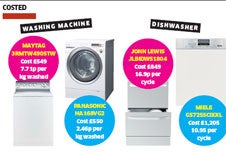Shoppers to be told running costs of new appliances
Manufacturers to declare how much electricity goods use to nudge consumers into going green

Your support helps us to tell the story
From reproductive rights to climate change to Big Tech, The Independent is on the ground when the story is developing. Whether it's investigating the financials of Elon Musk's pro-Trump PAC or producing our latest documentary, 'The A Word', which shines a light on the American women fighting for reproductive rights, we know how important it is to parse out the facts from the messaging.
At such a critical moment in US history, we need reporters on the ground. Your donation allows us to keep sending journalists to speak to both sides of the story.
The Independent is trusted by Americans across the entire political spectrum. And unlike many other quality news outlets, we choose not to lock Americans out of our reporting and analysis with paywalls. We believe quality journalism should be available to everyone, paid for by those who can afford it.
Your support makes all the difference.Shoppers are to be told the annual running costs of new televisions, dishwashers and fridges to persuade them to save money and help the environment.
Click HERE to view graphic (92 kb)
Campaign groups claim the current information on energy use – graded from A to F – does little to explain what impact buying different brands will have on electricity bills. Ministers are also convinced that people can be "nudged" into buying green with the promise of financial savings in the future.
The consumer group Which? and business leaders from the Confederation of British Industry are in talks about drawing up a standard for how every electrical gadget and kitchen appliance can be labelled with its running cost. It would mirror the per-year cost data already published for new cars.
Big-name retailers will be asked to sign up to a voluntary scheme to spell out "real-world costs" of the latest gizmos. For example, some LCD televisions can be twice as expensive to run as more energy-efficient brands, and the cost of running a washing machine can vary from 2.5p to more than 8p for each load. In some cases, cheaper appliances are also more efficient to run. According to data from the sust-it website, a Sony Playstation Slim 3 costs £24.05 a year to run – for two hours every day – compared with £6.73 for a Microsoft XBox. A Gorenje medium fridge freezer costs £780 to buy, with an annual running cost of £24.12, whereas a similar £588 Hotpoint model would use £45.73 of electricity in 12 months.
Chris Huhne, Secretary of State for Energy, believes the key is to "make costs real and tangible, rather than abstract". "Although energy ratings on white goods are well understood, there's little awareness of how much it costs to run a kettle, a TV or a fridge – each day, each year, or each use," he said in a speech earlier this year. "Until you put a price on it, it's easy to ignore."
It is hoped that by providing a financial incentive for buyers to turn their backs on polluting products, manufacturers will be persuaded to invest in low-energy technologies. Some appliances which are more expensive on shop shelves could reap savings over cheaper models via their running costs.
Richard Lloyd, executive director of Which?, said: "People tell us that they want to know the full lifetime costs of major products, so we calculate the annual running costs of all the refrigeration products and televisions we test. We're currently exploring rolling this out for all other major household products; our aim is that this will shortly be available to all."
The move is part of a wider drive by the Government to steer the public towards making green choices when buying goods, upgrading their homes or going on holiday. Earlier this month, a report by the Behavioural Insight Team – known as David Cameron's "Nudge Unit" – set out radical ideas aimed at persuading people to go green.
It includes a trial with the DIY store Homebase where a local council will offer a month's rebate from council tax bills to householders who buy products to cut their energy bills, such as loft insulation. In a separate pilot, people who club together to buy energy-efficient products will be offered "bulk buy" discounts. Five householders could save up to 25 per cent, the unit suggested.
People will also be sent details of average energy bills for similar homes, to show how they could be making savings.
Join our commenting forum
Join thought-provoking conversations, follow other Independent readers and see their replies
Comments